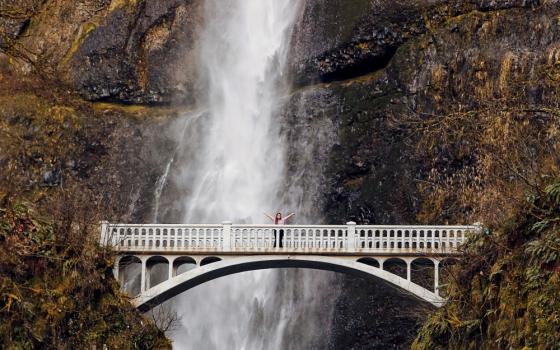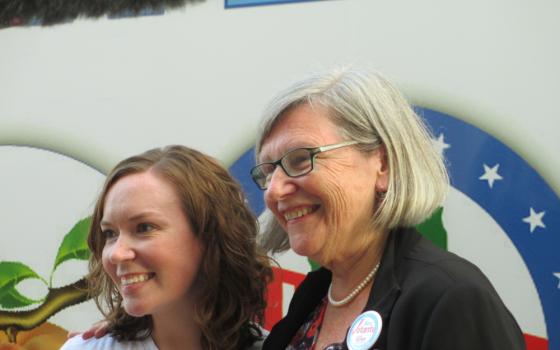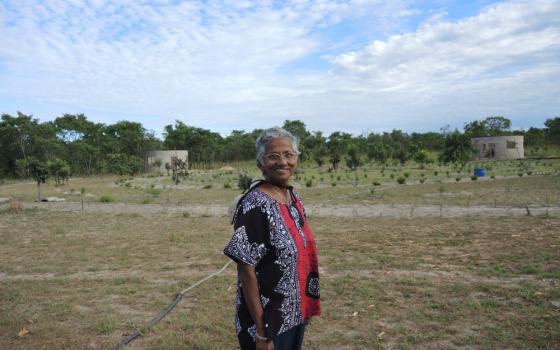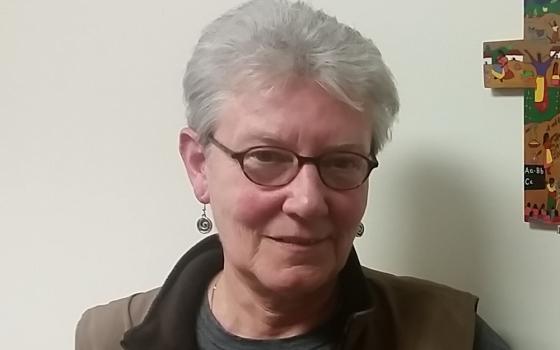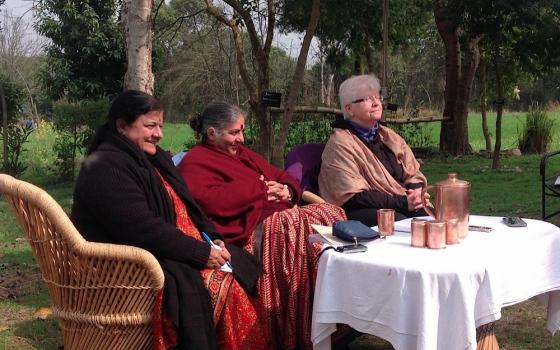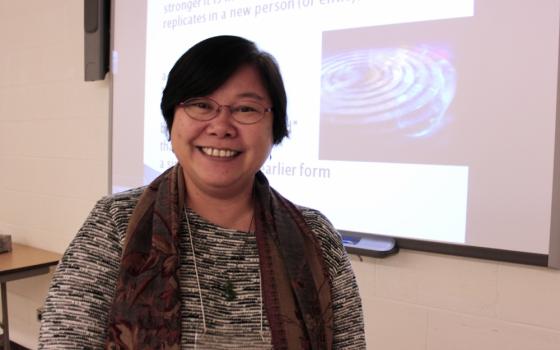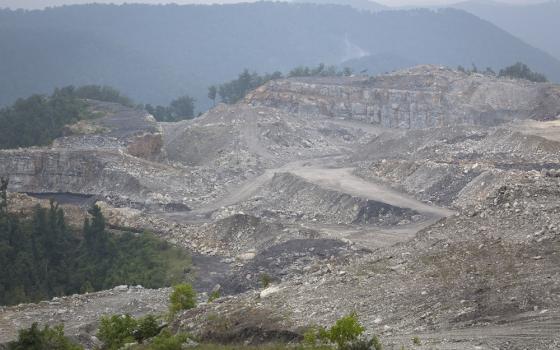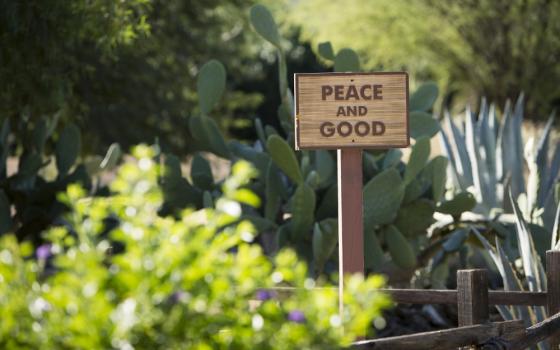Sisters and scholars reflect on the environmental encyclical and the importance of appreciating the interconnectedness of people and planet
"Laudato Si', on Care for our Common Home," Pope Francis’s 184-page treatise on the environment, ranges from technology to spirituality, carbon emissions to copper mining and environmental justice to materialism.
The encyclical is a forceful and integrated teaching on environmentalism. Global Sisters Report interviewed a number of sisters and academics around the world who have long worked on environmental issues, some for decades. Overwhelmingly, the sisters talked about feeling excited, optimistic and also grateful.
The sisters and scholars also were realistic. They know setbacks and frustrations are ahead. But the clear language of the encyclical leaves no room for doubt: The world is in peril, human beings are the cause, and we can also be the solution.
The encyclical encompasses so many points that we have organized our responses by the six chapters the encyclical is divided into.
Chapter One: What is happening to our common home
“It’s very clever to use the word ‘our home,’” said Maryknoll Sr. Marvie L. Misolas, who runs environmental seminars and retreats in the Philippines and advocates for the government to adopt green policies. She appreciates the direct and simple language of the encyclical, which she plans to use in her seminars with indigenous farmers to encourage them to stop burning trees for agriculture, a major cause of deforestation in the Philippines and around the world.
“The encyclical has that tone of ‘this is ours; this is not only for Catholics, but it’s for everyone,’” she said. “It gives people that sense of ownership. The term ‘our home’ is very important for me – it has a lot of connotations for all of us. Home is where we live, where we are acknowledged. In connection to the planet it is a very beautiful metaphor.”
Social Service Sr. Simone Campbell, executive director of NETWORK, a U.S. social justice lobby, said she appreciates the way the encyclical addresses our care of the environment as a culture, not just an abstract idea.
“Our culture becomes how we care for the environment around us,” Campbell said. “Some corporate interests want to level everything, to say everything should be the same for everyone. Pope Francis is saying, ‘No, the global reality is complex and needs to embrace diversity.’”
“The income and wealth gap in our world is part of the problem,” Campbell explained. “To see the intersection of climate, economic disparity, migration, hunger and poverty, housing and transportation – they’re all connected and recognizing this is hugely important for moving forward.”
Campbell said she was recently at a business roundtable where she got to ask the CEOs at publicly traded companies how they can justify not just getting an average salary of $10 million, but to then ask for $11 million.
“One said, ‘It’s not about money, it’s about winning. Money just happens to be the measure of winning,’” she relayed. “But Pope Francis says clearly the measure of winning is quality of life for all.”
Chapter Two: The gospel of creation
Franciscan Sr. Dawn Nothwehr said Pope Francis has given the discussion a prominence it never would have otherwise. Nothwehr is a professor at Catholic Theological Union in Chicago, where she researches environmental ethics through the lens of Franciscan theology, particularly the effects of global climate change on the poor. She is the author of Ecological Footprints: An Essential Franciscan Guide for Faith and Sustainable Living.
Nothwehr said that the biggest effect of the encyclical will be the global awareness it raises, because people will be forced to confront environmental issues.
“People really don’t know. But once people know and understand what’s going on, they begin to say, ‘We really do have parts of the city where we have higher asthma rates and children have higher levels of lead in their blood. Something’s not right,’” she said.
That, she said, can lead to the changes in individuals that create large-scale changes.
“We’ve got to take it to a personal level and have the conversion there,” Nothwehr said. “We can look at our personal lifestyles and not do damage to the environment around us. If we each do our own little bit, we can make a big change.”
“It is a time for all of us to wake up,” said Sr. Teresita Abraham, a Presentation sister originally from India who lives in Zambia and is creating the Garden of Oneness, an eco-spiritual organic garden and retreat center. “Looking at Zambia, when I came 27 years ago, the air was clean and the soil was clean and the rivers were clean. Today, so much pollution. There was no plastic anywhere, but now everything is strewn with plastic.”
The encyclical, Abraham said, is a wake-up call for Catholics and the entire world.
“We must wake up, not only to care for the Earth. It is about that communion with God, with one another, and all of creation.”
Pope Francis mentioned this trinity of God, humans and Earth throughout the encyclical.
“We cannot experience God except in this home,” Abraham continued. “We cannot hear the heartbeat of God except in this home. If we can really have that sense that ‘this is holy ground,’ then we can treat each other with that sense of sacredness. We can relate to everything in life with sense of sacredness we can really hear the heartbeat of God beating in everything.”
“I feel like [the encyclical] came at the nick of time,” she added. “I’m really delighted that as leader of the church he’s writing this for all of humanity. Since he [became pope] he has really captured the heart of the world somehow. What he says carries weight and he has a huge influence. I really believe it will really help and make a shift in human consciousness.”
Chapter Three: The human roots of the ecological crisis
Thomas A. Tweed likes the links the encyclical makes between environment and justice. Tweed holds the Harold and Martha Welch Endowed Chair in American Studies at the University of Notre Dame. Tweed has served as the president of the American Society for the Study of Religion, and is currently president of the American Academy of Religion.
“What strikes me as most helpful moving forward is that sustainability is imagined both ecologically and socially,” Tweed said. “We can’t just ask if there’s clean air and water, we also have to ask if there’s peace and justice. . . . The document makes clear that we don’t have to decide between worrying about the poor or ecological destruction – we have to worry about both because it’s the poor who suffer the ecological destruction.”
The relationship goes both ways, he said.
“That’s the real contribution to Catholic social teaching, linking global inequity and climate change. It’s not a question of either/or; it’s both/and,” Tweed said. “There can’t be peace and justice if we don’t have sustainable habitats, and you can’t have sustainable habitats if you have these massive inequities.”
Mary Evelyn Tucker said the fact that the pope classified the environment as a moral issue changes everything. Tucker is a Senior Lecturer and Senior Research Scholar at Yale University where she teaches in a joint master’s degree program between the School of Forestry and Environmental Studies and the Divinity School. She directs the Forum on Religion and Ecology at Yale with her husband, John Grim.
“To contribute to global warming and compromise our planetary life systems is seen by the pope and many others as morally problematic,” Tucker said. “This is a watershed moment – a broadening of ethics to include both humans and nature. Just as the move from segregation in the '60s was sparked by moral voices, so too the growing turn from unsustainable environmental and economic practices is being encouraged by ethical concerns now led by the pope. It is no wonder there is push back!”
Chapter Four: Integral ecology
Dominican Sr. Margaret Mayce said that for too long, issues have been addressed in isolation. Mayce is the non-governmental organization representative for the Dominican Leadership Conference at the United Nations and works in social development.
“He’s emphatic about the reality that everything is connected,” Mayce said. “The United Nations has had a silo approach to everything: Economics has its place, the environment has its place and the social has its place, and that’s why the world is such a mess now.”
She also loves that the encyclical calls for common but differentiated responsibility, meaning that while we’re all responsible for, say, carbon emissions, wealthy countries that produce more carbon, like the United States, should bear a larger burden of responsibility than a poor country.
“It’s great that he addresses the fact that national sovereignty often trumps the common good. That’s frequently a problem at the U.N.,” Mayce said. “The thing most nations are resistant to is a legally binding framework, because nobody wants to be held responsible. And the ones that pay the highest price for that are the poor.”
Passionist Sr. Gail Worcelo said the encyclical ushers in a new “moment of grace” for the church. Worcelo is a co-founder of Green Mountain Monastery in Vermont, dedicated to the healing and protection of Earth and its life systems.
“It’s calling the whole human community, saying that we’re all inter-connected and share a common home,” Worcelo said. “It’s not just for the Catholic community, it’s for the world community.”
For decades, those who pointed out the connection between the spiritual and the natural worlds were ignored, she said. Now their message is being said from one of the biggest bully pulpits in the world.
“We have felt like lone voices for many, many years now,” Worcelo said. “We’re just thrilled that the pope, who has the capacity to influence the world, has come up with a document like this. I really think for the church, it’s its next moment of grace.”
She also hears loud echoes of what the monastery’s co-founder, the late Passionist Fr. Thomas Berry, had been saying since the 1980s.
“I’m reading Thomas Berry all through the encyclical,” Worcelo said. “Many people have been preparing the soil for this encyclical to take root.”
Chapter Five: Lines of approach and action
Adrian Dominican Sr. Patricia A. Siemen appreciates the way the pope calls for legal frameworks to make the needed changes. Religion has a role in solving the environmental problem she said, but governments and international organizations must take action as well.
“He talks about it in a language common people can understand," she said. “You don’t have to be a policy analyst.” Siemen is an attorney and currently serves as the director of the Center for Earth Jurisprudence at Barry University School of Law in Orlando, Florida.
“I’m very pleased with his blend of spirituality, science and common sense,” she said, referencing the title's language in particular. “Catholic social teaching is about the common good . . . this addresses the common good and the good of the commons, the common air, water and soil. That’s kind of a lone cry today.”
Rabbi Yonatan Neril, the director of the Israel-based Interfaith Center for Sustainable Development, said one way to implement the encyclical’s lessons is through educating religious leaders. According to a study they will publish this week, out of 231 religious learning institutions surveyed in North America, including seminaries and universities from all religions, only a quarter (64 institutions) have courses on ecology.
A 2014 survey by the Public Religion Research Institute and the American Academy of Religion found that about 60 percent of U.S. Americans who attend religious services said their clergy rarely or never speak about the environment, Neril pointed out. However, the same survey found that among congregations that did hear about environmental issues in a religious setting, people were much more likely to be concerned about climate change. This emphasizes the importance of the religious response to help heal the environmental issues.
“Part of the way we think of moving the needle is educating the next generation of clergy,” he said. “Religion is the largest organization in the world, and if it’s not part of the solution, there’s not going to be a solution. That’s why your priest should be talking about it.”
Sr. Marvie L. Misolas, the Maryknoll sister from the Philippines quoted above in the section on Chapter One, believes governments and political organizations can play an important part in the solution, if they are empowered and guided by activists who care. “[Pope Francis] didn’t mince words, he said the international conferences [like the United Nations] are weak in terms of addressing what needs to be done, and that’s really a challenge,” she said.
Misolas is working with other activists in the Philippines to audit environmental laws in her country, and she plans to utilize sections of the encyclical as a lens to examine the laws. “The pope mentioned about how the laws are framed for benefiting other sectors,” she said.
“When I study the governments on climate change, it’s just shocking at times,” Misolas said. “There’s so much frustration; it’s always the same themes that we’re using so much resources, and yet in the end what gets [into the laws] is not for the common good.”
But she warned that the challenge of the encyclical will be to ensure that it doesn’t become another document gathering dust in a forgotten Vatican filing cabinet. “How are we going to immerse ourselves into what the encyclical is saying?” she asked. “How is the Catholic church going to act and implement what the pope is saying?”
Chapter Six: Ecological education and spirituality
The encyclical changes the foundation of the church’s thought, explained Sr. Simone Campbell, the Social Service sister and director of NETWORK quoted above in the section on Chapter One. This means it will affect everything that comes after.
“It’s a totally different approach. He talks about humans depending on the Earth. So we’re beholden to the Earth, beholden to the environment,” Campbell said. “That’s a huge shift. That’s as big as the shift from figuring out the Earth wasn’t the center of the universe. For once, we’re ahead of the curve.”
Teresita Abraham, the Presentation sister in Zambia quoted in the section above on Chapter Two, appreciates the pope’s nod to local cultures around the world, which often have had a better balance with their environment – and have much to teach the industrialized world.
“Indigenous people really had a very compassionate loving . . . kinship with everything,” she said. “We lost it somewhere in our genes. . . . The Earth gave birth to us, and this is inside of us, it is in our DNA, but we have drowned it maybe because of market economy and greed, our own personal and corporate greed. We have to reclaim it.”
“We are all products of a certain mindset, we have become victims of learning, in church and school and institutions, the mentality of separateness, the mentality of domination, the mentality of division. Now we are waking up to the reality that everything came from the same source, and everything bears the light of God and that makes us one and makes us brothers and sisters to each other.”
She said Presentation sisters have made a concentrated effort to honor the part of their charism of celebrating the interconnectedness of everything, including God and nature, by implementing projects like an educational organic farm in Zambia and a series of educational seminars across the country called “For Our Care of the Earth, Our Responsibility.”
“There is a huge awakening in humanity, that we cannot care for the poor without caring for the Earth that sustains the poor,” she said. “If we look around at the realities of our Earth today, where we have the biggest environmental problems, that’s where people are most poor. As a church, as religious women, the life of our communities is that we’ve done so much to help the poor, which has been wonderful work for centuries.”
The encyclical lays out this fact clearly, strengthening the on-the-ground knowledge sisters have understood for a long time already.
“One of the most beautiful things in humanity is that we have the ability to make shifts in our practices and our values,” she said. “So we can listen to the beat of our time, and we can make this shift now.”
[Melanie Lidman is Middle East and Africa correspondent for Global Sisters Report based in Israel. Dan Stockman is U.S. national correspondent for GSR. Follow him on Twitter @DanStockman or on Facebook.]
